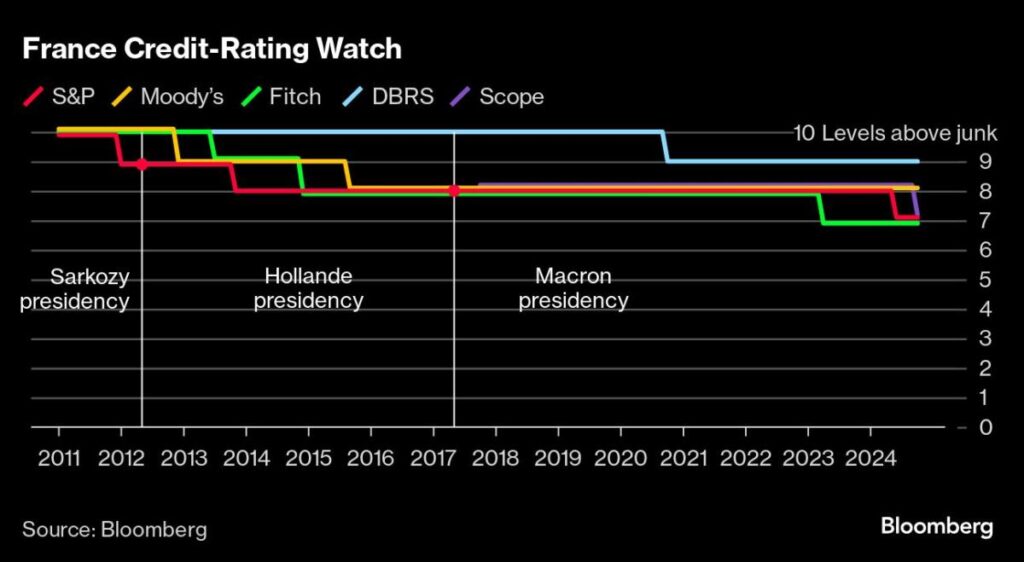Emmanuel Macron’s weakened grip on power within France’s shared governmental framework is becoming increasingly evident and problematic. This deterioration of authority was particularly highlighted during a recent episode where Macron directed an irate outburst at his cabinet ministers, journalists, and political analysts. He accused them of showing “a lack of professionalism” for leaking his comments regarding Israel, which he felt were mischaracterized. His unusual display of frustration as he faced reporters post-European Union summit underscored the erosion of trust between him and his administration, a sentiment exacerbated by the loss of his parliamentary majority in a summer election that saw Marine Le Pen’s far-right party dominate results against Macron’s centrists.
The controversy erupted when Macron reportedly criticized Israeli Prime Minister Benjamin Netanyahu during a cabinet meeting, implying that Israel’s establishment was founded on a United Nations resolution. This remark incited considerable backlash, particularly from Netanyahu himself, as well as members of the Jewish community and some politicians, including Senate President Gérard Larcher, who expressed disbelief at Macron’s purported historical misinterpretation. While Macron swiftly reaffirmed his support for Israel, he argued that France has the prerogative to occasionally diverge from Netanyahu’s positions, catalyzing even more tension in diplomacy.
As concerns mount regarding his administration’s ability to govern effectively in the aftermath of the electoral setback, Macron’s call for an early election has led to protracted negotiations with the French left and the subsequent appointment of a conservative prime minister, Michel Barnier. Barnier emerged from the talks as a seasoned diplomat, recently noted for his work as the EU’s chief Brexit negotiator. His international presence, exemplified by a visit to Brussels for a meeting with European conservatives, indicates a strategic shift in Macron’s governance approach. There appears to be a clear intention to share European policy responsibilities rather than maintain sole control, suggesting a significant shift in power dynamics.
The loss of the parliamentary majority restricts Macron’s capacity to enact domestic policies, compelling him to navigate alliances with more conservative elements in his government, such as the hardline Interior Minister Bruno Retailleau. These dynamics are particularly critical as two cabinet members have already expressed resignation threats over budgetary disagreements, foreshadowing potential instability within the government. Concurrently, the political landscape is fraught with looming challenges, particularly concerning financial stability as highlighted by recent credit downgrades from major rating agencies.
The downgrading of France’s credit rating by Scope Ratings from AA to AA- is indicative of a troubling fiscal outlook, particularly as the country grapples with a burgeoning budget deficit and political hurdles that inhibit necessary reform. The upcoming budget for 2025 is shaping up to be a significant flashpoint as opposition parties may unite to challenge Barnier’s government through a confidence vote. Such a vote, potentially instigated by Le Pen’s National Rally, could endanger the broader coalition’s stability, making financial and fiscal proposals a vital component for maintaining government integrity.
In light of these developments, the National Rally’s demands for fiscal measures—like taxing superdividends and share buybacks—place considerable pressure on Barnier’s administration to act decisively on the economic front. National Rally lawmaker Jean-Philippe Tanguy’s statement regarding an abstention from a confidence motion, contingent on the government addressing issues of debt and fiscal fairness, signals an impending showdown as Macron contends with both external scrutiny and internal dissent. The evolving political situation complicates Macron’s agenda, suggesting that without adept maneuvering and responsive governance, the cohesion of his administration may be at risk.

